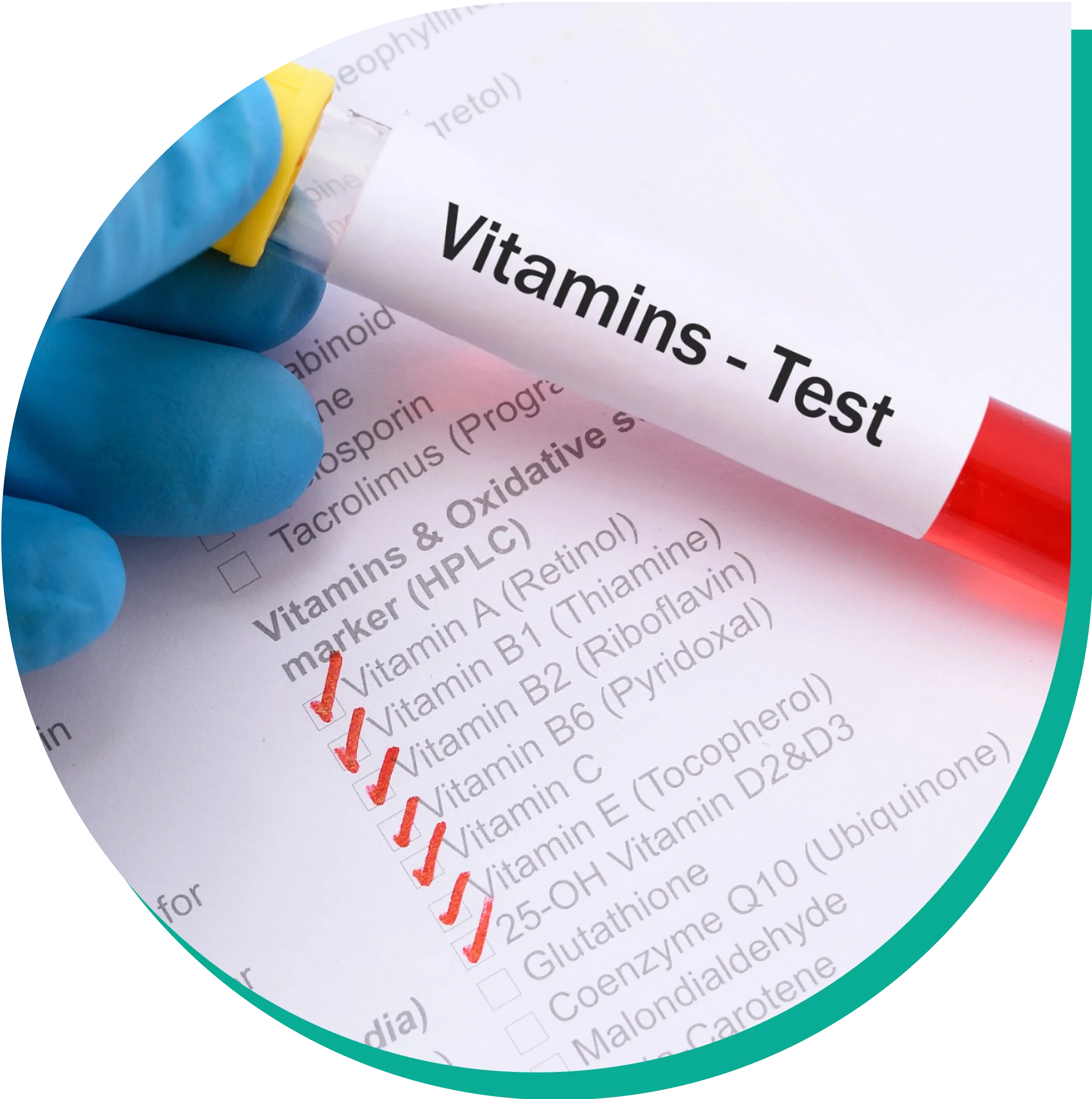
Al Borg Diagnostics
Vitamin levels test: What You Need to Know About the Test
Sometimes you may experience fatigue, lack of energy, body aches, or unexplained symptoms, which could be related to a vitamin deficiency. Vitamins are essential for overall health and organ function, and it’s important to focus on dietary diversity to ensure adequate intake. If you are looking for a way to assess the vitamin levels in your blood, continue reading the following article, as we will provide the most important information about vitamin levels test. (1)(4)
Vitamin levels test: What is it?
Vitamin levels test, also known as a vitamin test, is a laboratory test that detects the levels of vitamins in the body, such as vitamin A, vitamin B9 (folate), vitamin B12, vitamin D, vitamin E, and vitamin K.
Despite our need for small amounts of vitamins daily, they are crucial in maintaining overall health, so vitamin deficiencies can lead to complications or serious health conditions. Research indicates that the most common vitamin deficiencies are vitamin B12, vitamin B6, vitamin D, and vitamin C. (2)(4)
When Should You Undergo the Test?
It’s essential to consider undergoing a vitamin levels test in the following cases:
1. The appearance of symptoms of vitamin deficiencies:
The symptoms of vitamin deficiencies vary depending on the specific deficient vitamin. However, they share common symptoms such as:
- Fatigue.
- Lack of energy.
- Weakness.
- Dizziness.
- Hair loss.
- Brittle nails.
- Mouth ulcers.
- Gum bleeding.
- Red skin bumps.
Furthermore, vitamin B12 or B6 deficiency can lead to anemia and low levels of red blood cells, essential for transporting oxygen and nutrients to the body’s cells. This means that low levels of these vitamins can cause feelings of fatigue, weakness, headaches, dizziness, and pale skin.
It’s worth mentioning that severe deficiencies in vitamins can lead to serious conditions such as impaired physical and mental growth in children, blindness, or increased susceptibility to diseases and infections. (1)(2)
2. Individuals at Risk of Vitamin Deficiencies
Specific individuals may be more prone to experiencing vitamin deficiencies. In such cases, it is advisable to undergo normal vitamin levels tests to maintain normal levels. Some of these groups include: (2)
- Pregnant women.
- Young children in growth stages.
- Individuals with digestive system disorders such as Crohn’s disease and digestive disorders.
- Vegetarians or those who do not follow a balanced and diverse diet.
- Individuals are taking medications that affect vitamin absorption, such as proton pump inhibitors.
How is the Test Conducted?
This analysis is simple and involves few procedures. It’s worth noting that the test can be performed at home or a doctor’s clinic, with both methods working on the same principle and efficiency. Here is how to conduct a vitamin levels test: (3)(2)
1. Collect a blood sample
This can be done by pricking the finger for at-home testing or venous blood withdrawal for laboratory testing.
2. Send the sample to the laboratory
It’s essential to handle the sample carefully until it reaches the laboratory, as some vitamins can degrade quickly with light or heat.
Therefore, read all instructions regarding handling the blood sample, or you can undergo the test at the laboratory to ensure proper medical handling.
3. Sample analysis
The medical staff will examine the vitamin levels using various medical techniques.
You can perform vitamin levels test at any of Al-Borg Diagnostics branches, choose the All Vitamins Package that suits you, and find a wide range of other tests provided by a distinguished, highly accurate, and efficient medical staff.
Results of Vitamin Levels Test
The results of the vitamin levels test will be available within a few days. In the test, you will find the level of each vitamin in your blood and the normal level, considered the reference level.
After receiving the test results, it is important to consult your doctor to interpret them and determine if you need to take specific vitamin supplements or enhance your intake of vitamin-rich food sources. (3)(2)
The following are the expected levels of body vitamins: (5)
| Vitamin Type | Normal Level in Blood |
|---|---|
| Vitamin A | 30 - 80 micrograms/deciliter |
| Vitamin C | 0.2 - 2 milligrams/deciliter |
| Vitamin D | 0.7 - 3.3 international units/milliliter |
| Vitamin E | 5 - 25 micrograms/deciliter |
| Vitamin B1 | 90 - 140 nanomoles/liter |
| Vitamin B6 | 5 - 25 nanograms/milliliter |
| Vitamin B12 | 205 - 678 nanograms/milliliter |
| Vitamin B9 (Folate) | 5 - 21 micrograms/milliliter |
| Vitamin K | 0.13 - 0.19 nanograms/milliliter |
References:
- https://www.testing.com/vitamins-and-nutritional-testing/
- https://ada.com/micronutrients/vitamin-deficiency-test/
- https://study.com/academy/lesson/vitamin-nutritional-testing-procedures-analysis.html
- https://www.healthline.com/health/vitamin-deficiency-test#_noHeaderPrefixedContent
- https://labpedia.net/vitamins-normal-level-in-the-blood/





